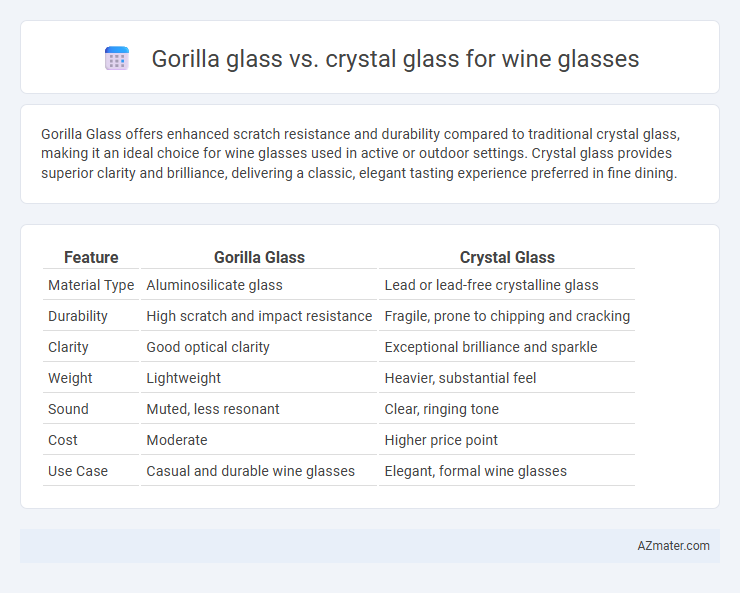Gorilla Glass offers enhanced scratch resistance and durability compared to traditional crystal glass, making it an ideal choice for wine glasses used in active or outdoor settings. Crystal glass provides superior clarity and brilliance, delivering a classic, elegant tasting experience preferred in fine dining.
Table of Comparison
| Feature | Gorilla Glass | Crystal Glass |
|---|---|---|
| Material Type | Aluminosilicate glass | Lead or lead-free crystalline glass |
| Durability | High scratch and impact resistance | Fragile, prone to chipping and cracking |
| Clarity | Good optical clarity | Exceptional brilliance and sparkle |
| Weight | Lightweight | Heavier, substantial feel |
| Sound | Muted, less resonant | Clear, ringing tone |
| Cost | Moderate | Higher price point |
| Use Case | Casual and durable wine glasses | Elegant, formal wine glasses |
Introduction to Gorilla Glass and Crystal Glass
Gorilla Glass, a toughened glass developed by Corning, is engineered for high durability, scratch resistance, and shatterproof qualities, making it an innovative material choice beyond traditional applications. Crystal glass, renowned for its clarity and brilliance, contains lead oxide or alternatives, providing a heavier, more elegant feel with superior light refraction ideal for fine wine glasses. Comparing both, Gorilla Glass offers enhanced strength and resilience, while crystal glass emphasizes visual appeal and acoustic properties favored in premium wine glass craftsmanship.
Material Composition: Gorilla Glass vs Crystal Glass
Gorilla Glass, composed primarily of alkali-aluminosilicate, offers exceptional toughness and scratch resistance due to its chemically strengthened surface, making it highly durable for everyday use. Crystal glass contains lead oxide or other metal oxides, which enhance its clarity, weight, and refractive properties, providing a luxurious appearance and resonant sound. The differences in material composition directly impact the durability, clarity, and overall user experience between Gorilla Glass and crystal wine glasses.
Durability and Scratch Resistance
Gorilla Glass offers superior durability and scratch resistance compared to crystal glass, making it more suitable for everyday wine glass use. Engineered with chemically strengthened aluminosilicate, Gorilla Glass resists chips and cracks better than traditional crystal, which is softer and more prone to scratching. This enhanced toughness ensures wine glasses made from Gorilla Glass maintain clarity and structural integrity over time.
Weight and Thickness Comparison
Gorilla Glass used in wine glasses is significantly lighter and thinner compared to traditional crystal glass, offering enhanced durability without compromising elegance. Typically, Gorilla Glass measures around 0.5 to 1 mm in thickness, whereas crystal glass ranges from 2 to 4 mm, contributing to a heavier weight in crystal stems. The lightweight nature of Gorilla Glass improves handling comfort and reduces the risk of breakage during use.
Clarity and Aesthetic Appeal
Gorilla Glass offers exceptional clarity with its ultra-smooth surface and high light transmittance, enhancing the vividness of wine colors and aromas for an elevated tasting experience. Crystal glass, renowned for its brilliance and refraction, provides superior aesthetic appeal with sparkling facets that add elegance and sophistication to wine presentation. While Gorilla Glass excels in durability and scratch resistance, crystal glass remains the preferred choice for luxury wine glasses due to its timeless clarity and exquisite visual appeal.
Wine Tasting Experience: Taste and Aroma
Gorilla Glass wine glasses offer enhanced durability and scratch resistance, preserving the clarity essential for visual wine assessment, which indirectly supports aroma appreciation. Crystal glass, known for its thinness and superior clarity, allows for a more delicate rim that concentrates and delivers nuanced aromas directly to the nose, enriching the sensory wine tasting experience. The choice between Gorilla Glass and Crystal glass influences the tactile interaction and aroma delivery, with crystal often preferred by connoisseurs for maximizing taste and aroma perception.
Safety and Breakage Resistance
Gorilla Glass offers superior breakage resistance compared to traditional crystal glass, making it a safer choice for wine glasses due to its chemically strengthened surface that resists scratches and cracks. Crystal glass, while prized for its clarity and elegance, is more fragile and prone to chipping or breaking with impact. For environments prioritizing durability and safety, Gorilla Glass provides enhanced longevity and reduced risk of injury from sharp shards.
Maintenance and Cleaning Convenience
Gorilla Glass offers superior scratch resistance and durability, making it easier to maintain without worrying about chips or cracks during cleaning. Crystal glass, while elegant and visually appealing, requires more delicate handling and specialized cleaning techniques to prevent damage and cloudiness. Both materials benefit from hand washing, but Gorilla Glass is notably more convenient for everyday use due to its resilience and ease of maintenance.
Price and Availability
Gorilla Glass wine glasses typically cost more than crystal glass options due to their advanced scratch-resistant technology and durable composition. Availability of Gorilla Glass wine glasses is more limited, often found in specialized retailers or online, whereas crystal glass wine glasses are widely available in most stores and come in a broad price range from affordable to luxury. Price-conscious buyers may prefer crystal glass for its accessibility and variety, while those seeking innovation might invest in the higher-priced Gorilla Glass alternatives.
Best Use Cases: Choosing the Right Glass for You
Gorilla Glass, known for its exceptional durability and scratch resistance, is ideal for wine glasses intended for outdoor events, casual settings, or travel where breakage risk is higher. Crystal glass offers superior clarity and brilliance, enhancing the wine tasting experience and making it the preferred choice for formal dinners and connoisseurs seeking elegance and enhanced aroma expression. Selecting the right glass depends on the balance between practicality and aesthetic appreciation, with Gorilla Glass excelling in resilience and Crystal glass delivering refined sensory appeal.

Infographic: Gorilla glass vs Crystal glass for Wine glass
 azmater.com
azmater.com